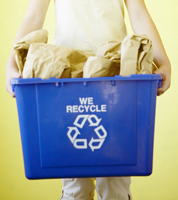Are You Green?

Whether you believe in global warming or not, we human beings produce and leave an imprint on the earth that is not particularly attractive. It’s called stuff, garbage, junk, leftovers, unusable goods—whichever you might prefer to name it. What we do with what we leave behind us has been an issue from day one. Solving that issue has resulted in great feats of engineering, the creation of public works, new inventions, many scientific discoveries, the development of new materials and new business ventures—yet still, we have garbage. Mounds of garbage. We bury it. We burn it. We build on top of it. We don’t yet know the best way to handle some of it.
Let’s be honest. We don’t have all of the best solutions to the problem. Still, we all should consider what we can do to lessen the amount of stuff we leave behind in our pathway through life.
Extend the Life of What You Have
Many of the things we throw away are reusable. At some point our clothes, shoes, accessories, dishes and pans, lamps and rugs, furniture, fixtures, tools, cars, etc.—the stuff of our lives—no longer fit our style or size, or are replaced by better products. We simply no longer want nor can use what we have. Some of these things are passed on to someone else in the family or given to a friend or neighbor. Some are sold at garage sales. Some are given to the church. It’s a good idea to find a new home for our stuff.
Recycle
Newspapers, aluminum cans and other metals, plastics and glass can be recycled curbside. Area companies, from salvage operations to our cities’ contractual garbage arrangements, try to help in the recycling effort. Sharing or donating things you no longer want or can use is recycling too, but after that, what happens?
Goodwill Does Both
For more than 70 years, Goodwill of Central Illinois has offered clothing, home textiles, house wares, furniture and other items that are in good, usable condition to the public. Employees are trained to sort according to quality standards to ensure that the items placed in the agency’s eight retail stores are suitable for purchase. Still, there is a tremendous amount that either does not sell or cannot be sold in the stores.
For many years, Goodwill has worked diligently to make certain that what is not sold does not end up in the landfill. In 2006 alone, Goodwill Industries of central Illinois kept over three million pounds of clothing, cardboard, books and shoes from being dumped into our area’s landfill. Much of the unsold clothing is either transported to other countries or is salvaged for the creation of rags, rugs and other textile products. Metal from damaged or unusable items is salvaged. These recycling efforts only bring in pennies on the dollar, but it is worth it. This is Goodwill and it is part of what the organization does for its community.
What part will you play? Are you green? Do you recycle and try to keep the waste to a minimum? Global warming or not, we produce a lot and we consume a lot. In honor of Earth Day on April 22, think about it. Goodwill does, each and every day. All Goodwill locations accept donations. Find the one nearest you at www.goodwillpeo.org. IBI
Let’s be honest. We don’t have all of the best solutions to the problem. Still, we all should consider what we can do to lessen the amount of stuff we leave behind in our pathway through life.
Extend the Life of What You Have
Many of the things we throw away are reusable. At some point our clothes, shoes, accessories, dishes and pans, lamps and rugs, furniture, fixtures, tools, cars, etc.—the stuff of our lives—no longer fit our style or size, or are replaced by better products. We simply no longer want nor can use what we have. Some of these things are passed on to someone else in the family or given to a friend or neighbor. Some are sold at garage sales. Some are given to the church. It’s a good idea to find a new home for our stuff.
Recycle
Newspapers, aluminum cans and other metals, plastics and glass can be recycled curbside. Area companies, from salvage operations to our cities’ contractual garbage arrangements, try to help in the recycling effort. Sharing or donating things you no longer want or can use is recycling too, but after that, what happens?
Goodwill Does Both
For more than 70 years, Goodwill of Central Illinois has offered clothing, home textiles, house wares, furniture and other items that are in good, usable condition to the public. Employees are trained to sort according to quality standards to ensure that the items placed in the agency’s eight retail stores are suitable for purchase. Still, there is a tremendous amount that either does not sell or cannot be sold in the stores.
For many years, Goodwill has worked diligently to make certain that what is not sold does not end up in the landfill. In 2006 alone, Goodwill Industries of central Illinois kept over three million pounds of clothing, cardboard, books and shoes from being dumped into our area’s landfill. Much of the unsold clothing is either transported to other countries or is salvaged for the creation of rags, rugs and other textile products. Metal from damaged or unusable items is salvaged. These recycling efforts only bring in pennies on the dollar, but it is worth it. This is Goodwill and it is part of what the organization does for its community.
What part will you play? Are you green? Do you recycle and try to keep the waste to a minimum? Global warming or not, we produce a lot and we consume a lot. In honor of Earth Day on April 22, think about it. Goodwill does, each and every day. All Goodwill locations accept donations. Find the one nearest you at www.goodwillpeo.org. IBI

